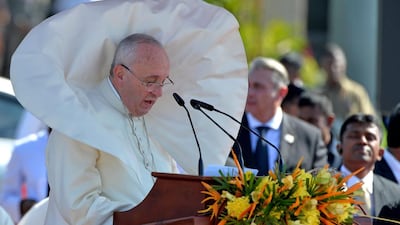COLOMBO // Pope Francis has said Sri Lanka must pursue the truth about injustices committed during 25 years of civil war, as he arrived in the country on Tuesday for the start of a week-long Asian tour.
While the pope didn’t specifically mention Sri Lanka’s refusal to cooperate with a United Nations investigation into alleged war crimes, he said that finding reconciliation after so much bloodshed “can only be done by overcoming evil with good, and by cultivating those virtues which foster reconciliation, solidarity and peace.”
A 2011 UN report said as many as 40,000 Tamil civilians may have been killed in a final government assault that ended the war in 2009, and that both sides committed serious human rights violations.
“The process of healing also needs to include the pursuit of truth, not for the sake of opening old wounds, but rather as a necessary means of promoting justice, healing and unity,” Pope Francis said.
The 78-year-old spoke on the tarmac of Colombo’s international airport, where he was welcomed by Sri Lanka’s new president, Maithripala Sirisena, who was sworn in on Friday after a shock election result.
Also Tuesday, the former president and Mr Sirisena’s challenger, Mahinda Rajapaksa, denied allegations that he attempted a coup to try to stay in power after last week’s presidential election.
Pope Francis was welcomed to Sri Lanka with traditional drummers and dancers from both the Sinhalese and Tamil ethnic groups, and a children’s choir singing a welcome song in both languages of Sri Lanka – as well as English and Italian.
Sri Lankan cardinal Malcolm Ranjith and other church leaders were also on hand to meet the pope.
Tamil Tiger rebels fought a 25-year civil war to demand an independent nation after decades of perceived discrimination on the part of governments dominated by the Sinhalese majority. UN estimates say 80,000 to 100,000 people were killed during the course of the war, though other reports suggest the toll could be much higher.
Tamils still claim discrimination, and human rights activists have said the government isn’t serious about probing abuses by its own armed forces, which are accused of targeting hospitals and blocking food and medicine. The UN report found that the rebels were accused of recruiting child soldiers and holding civilians as human shields.
In a speech he gave before the pope spoke, Mr Sirisena – who won the election by capitalising on the former president’s unpopularity among ethnic and religious minorities – said his government aims to promote “peace and friendship among our people after overcoming a cruel terrorist conflict.”
“We are a people who believe in religious tolerance and coexistence based on our centuries old heritage,” he said.
On Wednesday, Pope Francis will canonise Sri Lanka’s first saint, the reverend Giuseppe Vaz, a 17th century missionary credited with having revived the Catholic faith among both Sinhalese and Tamils amid persecution by Dutch colonial rulers, who were Calvinists.
Later in the day he flies into Tamil territory to pray at a shrine beloved by both Sinhalese and Tamil faithful.
On Thursday the Pope then heads to the Philippines, the largest Roman Catholic country in Asia and the third-largest in the world, for the final leg of his trip.
In the Philippines he’ll comfort victims of the devastating 2013 Typhoon Haiyan, which left more than 7,300 people dead or missing, displaced some 4 million and turned a densely populated region into a wasteland.
Millions of Filipinos are expected to turn out for his events, possibly surpassing the record 5 million who turned out for the last papal visit in 1995.
* Associated Press

